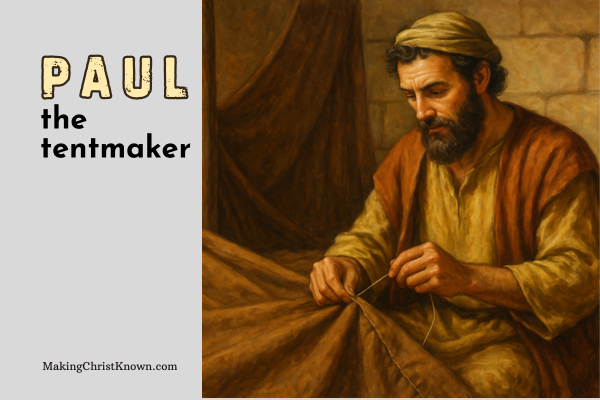Paul the Tentmaker: How a Simple Trade Became a Model for Ministry Today
When you think of the Apostle Paul, you might picture him preaching in synagogues, writing powerful letters to the early churches, or proclaiming Christ before kings. But what you may not know—or think about often—is that Paul was also a tentmaker by trade. Yes, Paul the Tentmaker earned a living with his hands while spreading the gospel with his heart.
That detail isn’t just a footnote—it’s deeply meaningful. His job was a key part of his ministry. And it has powerful lessons for us today, especially in a world where faith and work often feel like two separate things.
Let’s find out what Paul’s tent-making teaches us about work, calling, and sharing the gospel in everyday life.
Paul the Tentmaker: Where Scripture Shows His Day Job
We first read about Paul’s trade in Acts 18:1-3 (NASB):
“After these events Paul left Athens and went to Corinth. And he found a Jew named Aquila, a native of Pontus, having recently come from Italy with his wife Priscilla (mentioned in the women of the early church)… and because he was of the same trade, he stayed with them, and they worked together, for they were tentmakers by trade.”
In Corinth—a city known for its commerce and cultural diversity—Paul connected with fellow tentmakers Aquila and Priscilla. Rather than depend on the financial support of the churches he ministered to, Paul worked with his hands to support himself.
This choice was intentional. In 1 Thessalonians 2:9, Paul writes:
“For you recall, brothers and sisters, our labor and hardship: it was by working night and day so as not to be a burden to any of you, that we proclaimed to you the gospel of God.”
He wasn’t just surviving; he was modeling a work ethic that aligned with humility, integrity, and mission.
Why Did Paul Work a Secular Job?
Paul wanted to keep the message of Christ free from suspicion. In a time when traveling speakers were often in it for profit, Paul stood apart. He showed that the gospel wasn’t a business venture—it was life-giving truth.
In 2 Corinthians 11:9, he explains that he chose not to burden the church financially, saying:
“…I kept myself from being a burden to you in any way, and will continue to do so.”
He wasn’t above receiving support (he sometimes did), but when needed, he worked hard to provide for himself and others. His life was fully integrated—faith and work together.
What This Means for Us Today
You might be thinking, “Okay, but I’m not a pastor or an apostle. What does this have to do with me?”
Plenty.
In today’s world, many of us feel a pull between our jobs and our spiritual life. We may wonder: Does my 9-to-5 matter to God? Can I serve Him even if I’m not in full-time ministry?
Paul the Tentmaker answers with a resounding yes. Here’s how we can apply his example to our lives today:
1. Your Job Can Be Part of Your Ministry
Whatever your profession—teacher, technician, artist, grocery store clerk—you are in a place to reflect Christ. Paul made tents, but he also built relationships with people in his field. Through honest work, he lived his faith out loud. You can too.
2. Be a Light in the Marketplace
Paul saw the marketplace not just as an income stream but a mission field. Our workplaces today are no different. Whether you’re in meetings, behind a counter, or on Zoom, you’re surrounded by people who need hope.
Your kindness, integrity, and words of encouragement can make an eternal difference.
3. Hard Work Is a Witness
Paul’s work ethic was part of his credibility. People noticed. When we show up with excellence and humility, we mirror God’s character. Colossians 3:23 (NASB) reminds us:
“Whatever you do, do your work heartily, as for the Lord and not for people.”
4. Support Ministry Through Your Work
Not everyone is called to a formal mission field—but everyone can support it. Paul’s work allowed him to serve the church freely. Your income might help fund missions, support your local church, or simply free you to serve without strings attached.
Work Can Be Used For Worship
Paul the Tentmaker reminds us that secular work is sacred when surrendered to God. You don’t have to preach from a pulpit to make an impact. You can live out your faith right where you are—at your desk, in your studio, or behind the wheel.
So whatever you do, do it for the glory of God. Like Paul, let your work support your witness, not compete with it.
Whether you’re crafting tents or crafting emails—you are on mission.
What about you?
Have you ever felt the tension between your job and your faith? How can you see your work as part of your calling? Let me know in the comments or share your story—your Monday can be just as spiritual as your Sunday.
In Christ,
Bob
Discover more from Making Christ Known
Subscribe to get the latest posts sent to your email.
